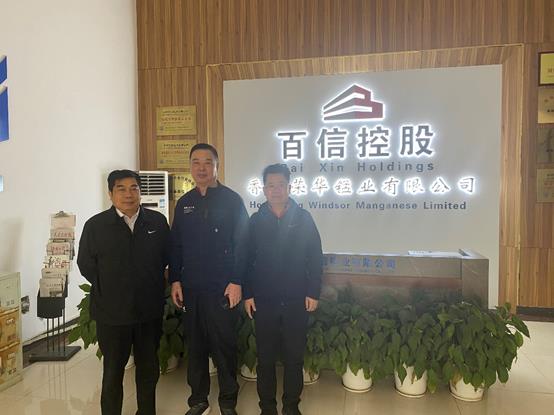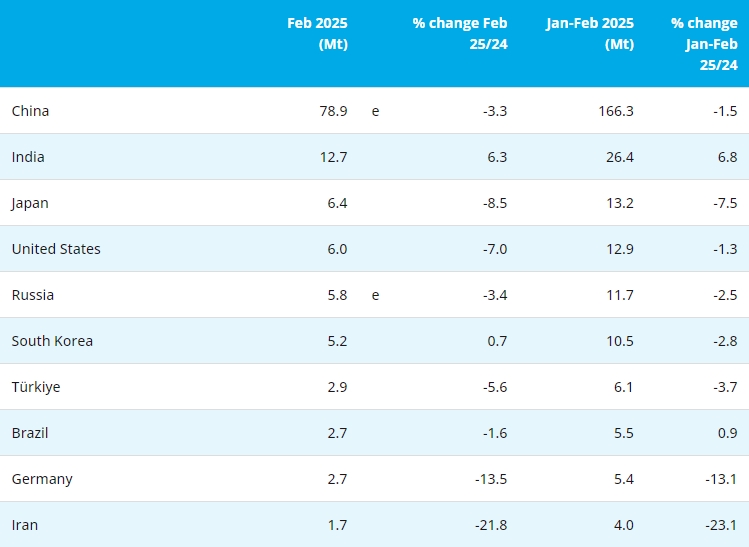China's automotive industry is working to adopt green materials in efforts to reduce carbon dioxide emissions and drive sustainable development in the world's largest auto market. Last year, steel consumption in the sector accounted for 6 percent of the country's total.
German luxury carmaker BMW announced it would join hands with one of China's biggest steel companies, HBIS Group, on Thursday. The two sides signed a memorandum of understanding that BMW's Shenyang production base in Liaoning province will use HBIS's green automotive steel from 2026.
The cooperation is the first of its kind in their respective industries in China. According to the MoU, BMW and HBIS will work together to develop low-carbon and green automotive steel and complete relevant certifications based on BMW's requirements.
The "green steel" is expected to be produced in a hydrogen-based DRIEAF (Direct Reduced Iron in Electric Arc Furnace), which would help BMW reduce carbon dioxide emissions in its supply chain by more than 230,000 metric tons per year.
The two sides will transparently collect and monitor carbon emissions' data throughout the life cycle of automotive steel, from iron-ore mining, steel manufacturing to the vehicle production process and end-of-life recycling.
BMW and HBIS will also jointly carry out research and development of carbon capture, utilization and storage methodologies, clean energy and other carbon-negative technologies, and establish a platform to train and develop talents in related fields.
Jochen Goller, president and CEO of BMW Group Region China, said: "Sustainability in the auto industry means much more than just putting electric vehicles on the road. BMW Group's holistic sustainability approach covers the whole life cycle of a vehicle, with the supply chain playing a major part. In Europe, we have partnered with two steelmakers for low-carbon steel.
"In China, we chose to work with HBIS for the supply of green steel from 2026. This is key progress since the launch of BMW's Low-Carbon Value Chain Initiative last year, and a major breakthrough for the collaboration between the automotive and steel industries.
"With the 'At Home in China' strategy, BMW Group will work with Chinese partners and drive sustainability through innovation, so as to actively contribute to China's dual carbon goals," Goller said.
At the BMW Group China Sustainability Summit held in June 2021, BMW partnered with the China Development Research Foundation to launch the Low Carbon Value Chain Initiative. Since then, in-depth research into key topics has been carried out, such as the low-carbon transformation of steel production, the accessibility of green electricity, the circular economy and relevant sustainability standards.
It is estimated that steel production accounts for around 20 percent of carbon dioxide emissions in the supply chain of a mid-sized electric car, only behind high-voltage battery production (26 percent) and light metal production (23 percent). Reducing the carbon footprint of steel production is therefore vital for the life cycle decarbonization of electric vehicles, BMW said.
HBIS was one of China's first steelmakers to issue a low-carbon green development plan and draw up a clear technology roadmap. It was also the first player in the industry to start a 1.2-million-tonne hydrogen metallurgy demonstration project, and has established an advantage in low-carbon metallurgy through the industrialized use of hydrogen energy.
According to the MoU, HBIS will finish the development and related certification within a defined schedule. Its decarbonization roadmap includes reducing carbon dioxide by more than 10 percent in current production processes through hydrogen-based DRI in the short term; and reducing carbon dioxide by more than 50 percent with newly established EAF processes in the mid-and-long term. After 2025, EAF processes will gradually move toward a 95 percent reduction of emissions through the use of green electricity.
Franz Decker, president and CEO of BMW Brilliance Automotive, said: "The signing with HBIS paves the way for us to significantly reduce carbon dioxide emissions at source in our supplier network.
"Simply put, green and low-carbon steel will help us produce greener cars and achieve our joint sustainability ambitions with HBIS. Together, we are contributing to China's industrial upgrading and green transformation," he added.
360-degree sustainability
The company is taking a 360-degree approach to sustainability, with carbon reduction and the circular economy as the two focal points of the company's strategy.
BMW Group believes that carbon reduction goals can only be achieved by realizing whole life cycle sustainability, from raw material sourcing, via the supply chain, production and vehicle use phase, all the way to recycling.
Across the entire value chain, the carmaker plans to reduce its carbon dioxide emissions per vehicle by 40 percent by 2030 compared to 2019. This includes a 20 percent reduction in the supply chain, an 80 percent reduction in production and a 50 percent reduction throughout ownership.
In the circular economy, the company is exploring ways to reduce the use of raw materials and waste, including ways to reuse parts and components, and increasing the proportion of recycled materials in products.
BMW i Vision Circular Concept demonstrates a vision for the future, using 100-percent recycled materials in vehicle design and where all materials can be recycled.
The carmaker established closed-loop recycling of high-voltage battery materials in partnership with Huayou Recycling in May, which also marks an example of how BMW is implementing circularity in China.
CHINA DAILY
Copyright © 2013 Ferro-Alloys.Com. All Rights Reserved. Without permission, any unit and individual shall not copy or reprint!
- [Editor:kangmingfei]



 Save
Save Print
Print Daily News
Daily News Research
Research Magazine
Magazine Company Database
Company Database Customized Database
Customized Database Conferences
Conferences Advertisement
Advertisement Trade
Trade














 Online inquiry
Online inquiry Contact
Contact

Tell Us What You Think